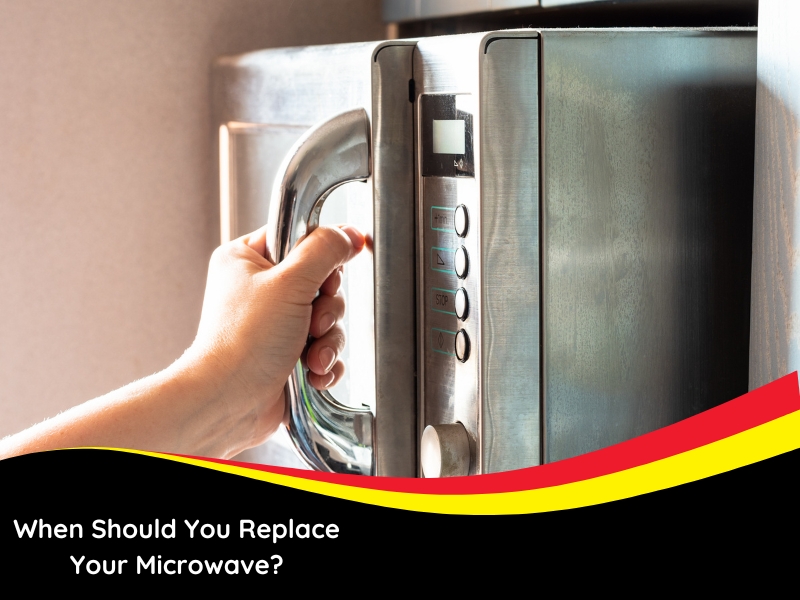
Blog
Microwaves are a kitchen staple for many households, offering a quick and convenient way to heat food and beverages. However, like all appliances, they don’t last forever. When considering replacing your microwave, there are a few key factors to keep in mind. In this article, we’ll help you determine when it’s the right time to invest in a new or refurbished microwave and how to make the most of your purchase.
How long should a microwave last before needing replacement?
Microwaves are built to last for many years, but their lifespan can vary depending on usage, quality, and maintenance. On average, a microwave can last anywhere from 7 to 10 years. To better understand this longevity, it is interesting to consider the history of microwave ovens and how they evolved from a scientific discovery into an essential kitchen appliance, influencing the designs and technologies we rely on today.
What are the signs that your microwave needs replacing?
Not all microwaves break down suddenly, and there are often warning signs before they stop working completely. Here’s what to look out for:
- Inconsistent heating: If your microwave struggles to heat food evenly, it might be time to replace it.
- Excessive noise: A loud humming or buzzing sound that wasn’t there before could indicate a problem.
- Arcing or sparks: If you see sparks or notice a burning smell, it’s a sign of a severe issue, and the microwave may be unsafe to use.
- Door problems: If the door doesn’t close properly or the latch is broken, the microwave might not be functioning correctly.
- Failure to turn on: If the microwave doesn’t power up, it could be a sign of an internal electrical issue.
- Old age: As microwaves age, their efficiency drops. If your microwave is over 10 years old and starts exhibiting issues, replacing it could be the most cost-effective solution.
How do repair costs compare to buying a new or refurbished microwave?
When your microwave breaks down, you might consider repairing it instead of replacing it. However, repair costs can sometimes be surprisingly high, and they might not always be worth it. Here’s a comparison of repair costs versus buying a new or refurbished model:
- Repair costs: While some repairs, such as replacing a fuse or turntable motor, may be relatively inexpensive, more complex issues (like magnetron failure) can be much costlier. In these cases, the repair costs might approach or even exceed the price of a new unit.
- New microwave: Buying a new microwave gives you the latest technology and features, as well as a full warranty. The cost of a new microwave can vary depending on the model and features. Still, it’s generally a straightforward solution for replacing an old or malfunctioning microwave.
- Refurbished microwave: A refurbished microwave is a great cost-effective alternative. These microwaves have been inspected, repaired, and tested to ensure they work like new ones, but they come at a fraction of the price of a brand-new model. They can offer the same performance and functionality, often with the added benefit of a warranty.
Can a refurbished microwave meet your needs just as well as a new one?
Many people hesitate to buy refurbished appliances, fearing that they won’t perform as well as new models. However, refurbished microwaves can meet your needs just as well as brand-new ones. Here’s why:
- Thorough inspection and testing: Refurbished microwaves undergo rigorous inspection and testing to ensure they work properly before being sold.
- Warranty: Most refurbished models come with a warranty, so if there are any issues, you can get it fixed or replaced.
- Affordable price: Refurbished microwaves offer great value for money without compromising on performance.
- Eco-friendly: Choosing a refurbished microwave helps reduce electronic waste, making it a more sustainable choice.
How much should you spend when replacing a microwave?
When replacing your microwave, the amount you spend depends on both your needs and your budget. Here’s a breakdown of the different options:
- Basic microwaves: These models are usually smaller with fewer features. They’re ideal for simple heating tasks but may lack advanced functions like defrosting or sensor cooking. If you’re looking for a straightforward option, a basic microwave might be enough.
- Mid-range microwaves: These offer a balance of price and functionality. Expect additional features like multiple cooking presets, larger capacities, and better power options. A mid-range microwave is perfect if you need more versatility in your kitchen.
- High-end microwaves: High-end models typically come with advanced features such as convection cooking, smart technology, and larger sizes. They’re perfect for those who want a versatile, high-performance appliance that can do more than heat food.
- Refurbished microwaves: Refurbished microwaves offer a cost-effective alternative to new models, often providing similar performance. With the proper care and maintenance, a refurbished unit can serve you just as well as a new one, often coming with a warranty for peace of mind.
What warranty options should you look for when replacing your microwave?
When purchasing a new or refurbished microwave, it’s essential to consider the warranty options. A good warranty ensures that you’re protected in case of any defects or issues. Here’s what to look for:
- Length of warranty: Many new microwaves come with a 1-year warranty. Refurbished models from reputable sellers like Microwave Factory often offer warranties ranging from 6 months to 12 months, providing you with peace of mind.
- Coverage: Make sure the warranty covers key parts like the magnetron, door, and electrical components. Some warranties only cover certain parts, so check the fine print.
- Customer support: A strong warranty should be backed by excellent customer support. Look for a company that offers easy returns and fast repair services.
How do you choose the best microwave for your needs and budget?
Choosing a top-quality refurbished microwave involves considering both your needs and your budget. Here are some tips to help you make the right choice:
- Size: Consider the size of your kitchen and how much counter space you have. Microwaves come in various sizes, so choose one that fits your space without overcrowding it.
- Power: Higher wattage means faster cooking times. For most households, a microwave with 800 to 1,200 watts is ideal.
- Features: Consider the features you need. Do you need a microwave with convection cooking, or is a basic model sufficient for reheating food?
- Budget: Determine your budget range and consider refurbished options for significant savings.
- Brand reputation: Look for brands known for quality and reliability. Read reviews and customer feedback to ensure you’re making a wise investment.
Ready to replace your microwave?
If your microwave is showing signs of wear and tear, or if it’s simply time for an upgrade, consider a refurbished microwave from Microwave Factory. Each unit undergoes thorough testing to ensure top-quality performance at a fraction of the price of new models. With a warranty and excellent customer service, you’ll get a reliable appliance without breaking the bank. Contact Microwave Factory today to explore our range of affordable options.





























